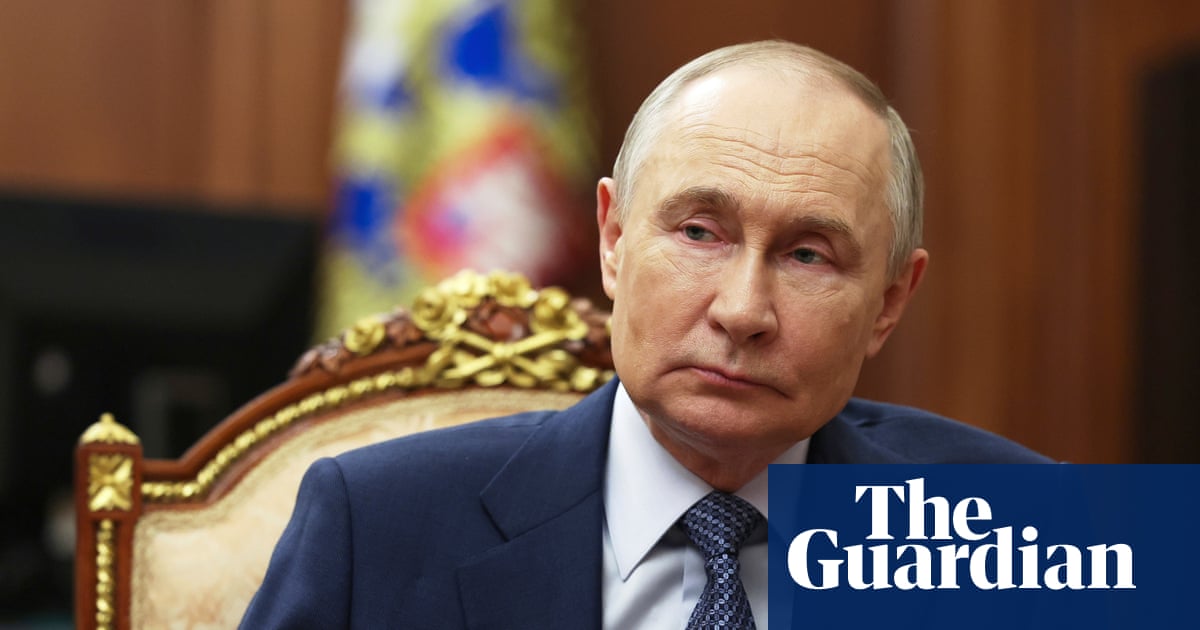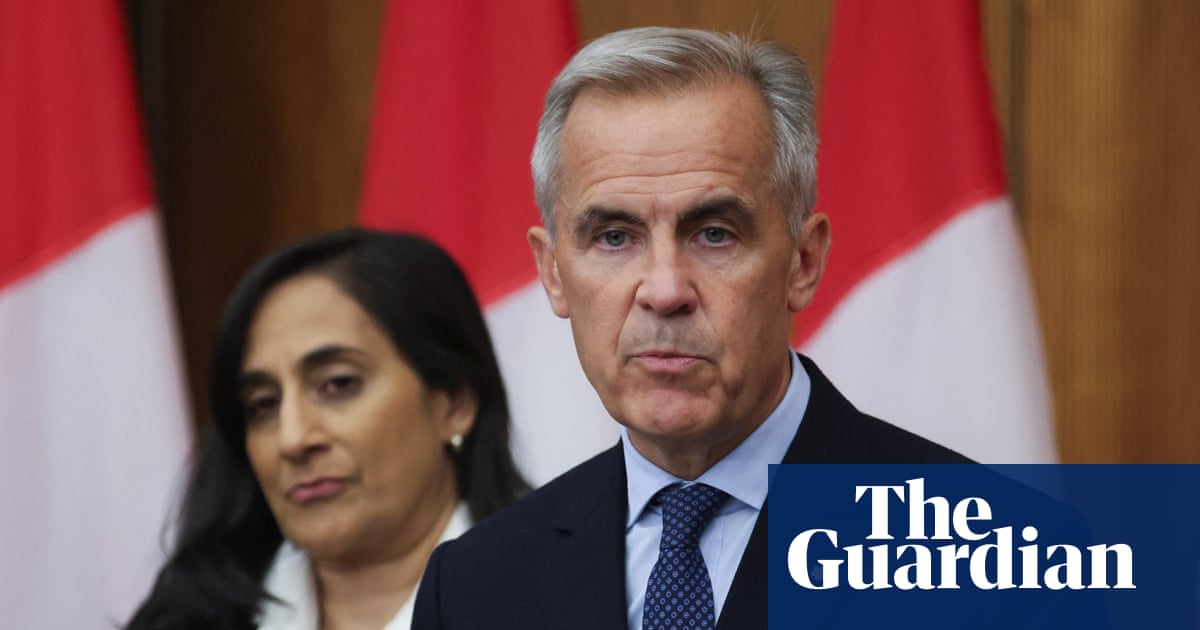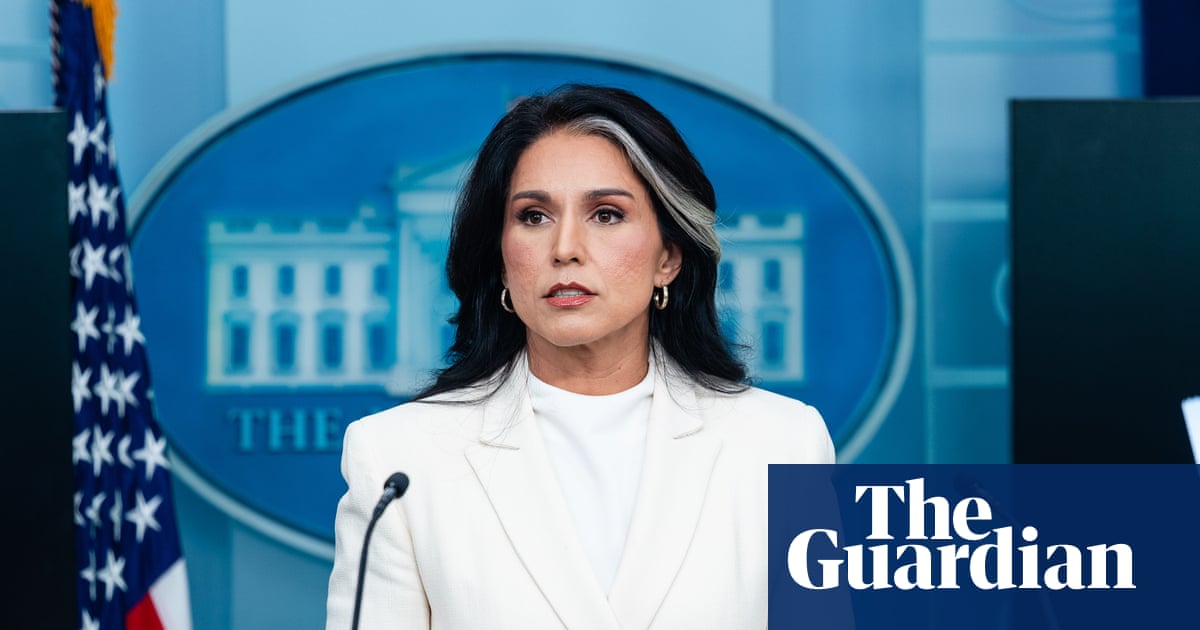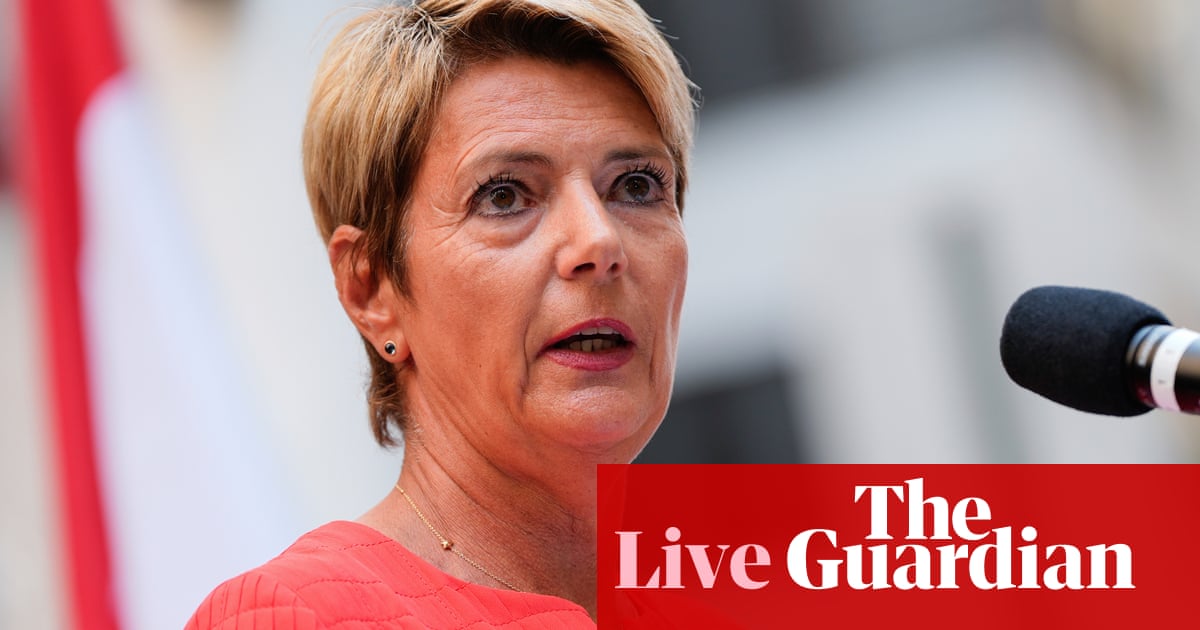Swiss leader says Trump administration foresees 'privileged' talks with 15 countries on US tariffs
The Swiss president says Switzerland is among 15 countries with which the United States plans to conduct “privileged” negotiations to help reach a deal after sweeping US tariffs on dozens of countries that have shaken global markets, reports the Associated Press (AP).
Karin Keller-Sutter, in an interview with broadcaster SRF published Friday, said she was “satisfied” with talks in Washington this week that included an International Monetary Fund conference and her one-on-one meeting with US treasury secretary Scott Bessent. Keller-Sutter also serves as Switzerland’s finance minister.
“The United States has defined a group of 15 countries with which it wants to find … a quick solution in this tariff question. Switzerland is part of this group of these 15 countries,” she told reporters separately late on Thursday in Washington, according to the AP.
It was not immediately clear which 14 other countries were included, but she told SRF that “the US envisages conducting – I would say somewhat privileged – negotiations and finding solutions” with that group.
Before the Trump administration paused some of its most stringent tariff plans, products imported from Switzerland had been set to face tariffs of 31% – more than the 20% tariffs on goods from the European Union. Switzerland is not a member of the 27-country bloc.
The AP reports that, according to figures published by the Swiss embassy in Washington, the US has been Switzerland’s most important goods export market worldwide since 2021, while Switzerland is the fourth most important export market for US services. The bilateral trade volume in goods and services between Switzerland and the US reached $185.9bn in 2023, the embassy says on its website.
Keller-Sutter said a memorandum of understanding was to be drawn up after which negotiations can begin. A document would also lay out the most important topics, and “we have also been assigned a specific contact person. This is not easy in the US administration,” she was quoted as saying.
“The U.S. authorities have clearly expressed their desire to find a solution with Switzerland,” Keller-Sutter told SRF. She said no timetable had been set, but the two sides agreed to move forward quickly “because uncertainty is poison for the economy.”
Trump’s sweeping “liberation day” tariffs on 2 April set off turmoil in world stock markets. A week later, Trump spoke by phone with Keller-Sutter in a conversation that her office said focused on tariffs. She emphasised the “important role of Swiss companies and investments” in the US.
Hours later, Trump announced the U-turn that paused the steep new tariffs on about 60 countries for 90 days, fanning speculation – which was not confirmed – in some Swiss media that her chat with Trump might have played a role in the change of course.
On Thursday, Swiss foreign minister Ignazio Cassis, during a trip to Beijing, said the US tariffs have thrust the affected countries into “a sort of coalition” to try to reach a deal with the US. Meanwhile, on Monday, Swiss pharmaceuticals company Roche announced plans to invest $50bn in the US over the next five years – an unspecified amount of which has already been under way, reports the AP.
Key events Show key events only Please turn on JavaScript to use this feature
Former US social security head predicts ‘interruption of benefits’ amid Doge cuts

Robert Tait
Social security, the sacred cow of the US welfare system dating back to Franklin Roosevelt’s 1930s New Deal, faces significant threat as it reels under the stress of Elon Musk’s aggressive incursions, its former head has said.
Martin O’Malley, former commissioner of the social security administration (SSA) under Joe Biden, said such a breakdown could result in disruption to benefit payments on which more than 70 million Americans depend, sending shock waves across the economic and social landscape and posing a political challenge to Donald Trump, who has repeatedly vowed that social security will be left untouched in his radical remake of US government.

The warnings come amid a welter of reports of website outages, regional office closures and recipients being wrongly declared dead following the activities of Musk’s unofficial “department of government efficiency”, also known as Doge, which has been missioned to make drastic cutbacks and root out supposed waste, fraud and abuse.
About 7,000 of the SSA’s 57,000-strong workforce have been culled in recent weeks as Musk, the tech billionaire and world’s richest person, has sought to live up to his vow to slash non-essential federal workers. More job cuts are feared to be on the way.
Insiders and unions warn that the cuts already made threaten to render the system inoperable.
“I truly believe there’s going to be some interruption of benefits for some period of time, and I believe that will probably happen in the very near future,” the Long Island Press quoted O’Malley as telling a town hall meeting this week hosted by two Democratic representatives from New York, Laura Gillen and Tom Suozzi.
“I’ve never hoped I was wrong so much.”
Swiss leader says Trump administration foresees 'privileged' talks with 15 countries on US tariffs
The Swiss president says Switzerland is among 15 countries with which the United States plans to conduct “privileged” negotiations to help reach a deal after sweeping US tariffs on dozens of countries that have shaken global markets, reports the Associated Press (AP).
Karin Keller-Sutter, in an interview with broadcaster SRF published Friday, said she was “satisfied” with talks in Washington this week that included an International Monetary Fund conference and her one-on-one meeting with US treasury secretary Scott Bessent. Keller-Sutter also serves as Switzerland’s finance minister.
“The United States has defined a group of 15 countries with which it wants to find … a quick solution in this tariff question. Switzerland is part of this group of these 15 countries,” she told reporters separately late on Thursday in Washington, according to the AP.
It was not immediately clear which 14 other countries were included, but she told SRF that “the US envisages conducting – I would say somewhat privileged – negotiations and finding solutions” with that group.
Before the Trump administration paused some of its most stringent tariff plans, products imported from Switzerland had been set to face tariffs of 31% – more than the 20% tariffs on goods from the European Union. Switzerland is not a member of the 27-country bloc.
The AP reports that, according to figures published by the Swiss embassy in Washington, the US has been Switzerland’s most important goods export market worldwide since 2021, while Switzerland is the fourth most important export market for US services. The bilateral trade volume in goods and services between Switzerland and the US reached $185.9bn in 2023, the embassy says on its website.
Keller-Sutter said a memorandum of understanding was to be drawn up after which negotiations can begin. A document would also lay out the most important topics, and “we have also been assigned a specific contact person. This is not easy in the US administration,” she was quoted as saying.
“The U.S. authorities have clearly expressed their desire to find a solution with Switzerland,” Keller-Sutter told SRF. She said no timetable had been set, but the two sides agreed to move forward quickly “because uncertainty is poison for the economy.”
Trump’s sweeping “liberation day” tariffs on 2 April set off turmoil in world stock markets. A week later, Trump spoke by phone with Keller-Sutter in a conversation that her office said focused on tariffs. She emphasised the “important role of Swiss companies and investments” in the US.
Hours later, Trump announced the U-turn that paused the steep new tariffs on about 60 countries for 90 days, fanning speculation – which was not confirmed – in some Swiss media that her chat with Trump might have played a role in the change of course.
On Thursday, Swiss foreign minister Ignazio Cassis, during a trip to Beijing, said the US tariffs have thrust the affected countries into “a sort of coalition” to try to reach a deal with the US. Meanwhile, on Monday, Swiss pharmaceuticals company Roche announced plans to invest $50bn in the US over the next five years – an unspecified amount of which has already been under way, reports the AP.
The US justice department says it did not fire a former pardon attorney, Liz Oyer, after she refused to recommend reinstating Mel Gibson’s gun rights.
But in the latest episode of Politics America Weekly Oyer tells Jonathan Freedland a different story, one she believes points to a wider crackdown by the Trump administration on the rule of law in the US.
You can listen to the podcast here:
China says US deep-sea mining plan 'violates international law'
A US push to approve deep-sea mining in domestic and international waters “violates international law”, China warned on Friday, after a White House order to ramp up permits, reports Agence France-Presse (AFP).
“The US authorisation … violates international law and harms the overall interests of the international community,” Chinese foreign ministry spokesperson Guo Jiakun said.
President Donald Trump on Thursday signed an executive order to “expedite the process for reviewing and issuing seabed mineral exploration licenses and commercial recovery permits in areas beyond national jurisdiction”.
Private companies and governments have long considered the mineral and metal resources found in stretches of the ocean floor, but they have mostly held off while waiting for the International Seabed Authority (ISA) regulator to devise rules – a process that began in the 1990s.
The US never ratified the agreements that empowered the Isa’s jurisdiction and is not a member of the UN-affiliated body, reports AFP.
Trump’s order demands Washington become a “global leader” in seabed exploration and “counter China’s growing influence over seabed mineral resources”.
Beijing, which has so far held off mining in international waters while awaiting Isa rules, warned Trump’s orders “once again expose the unilateral approach and hegemonic nature of the United States”.

Jakub Krupa
US peace envoy Steve Witkoff is in Moscow today for further talks with Russia, including president Vladimir Putin, on Donald Trump’s peace plan for Ukraine.
Hoping to get results before Trump’s 100 days in the office next week, Witkoff will have to find a way to convey the sense of the president’s frustration with the Russian attack on Kyiv on Thursday, while hoping to make good progress as Washington tries to put pressure on Kyiv to agree to its proposal.
During a gathering of the Chinese Communist party’s top decision-making body focused on economic work and attended by president Xi Jinping, leaders acknowledged that “the impact of external shocks is increasing”, reports Agence France-Presse (AFP), citing state news agency Xinhua.
They also said they would seek to “work with the international community to actively uphold multilateralism and oppose unilateral bullying practices”, said Xinhua.
Last year saw China achieve record exports, providing a key source of economic activity as domestic challenges in the property sector and deflationary pressure persisted.
Friday’s politburo meeting “shows the government is ready to launch new policies when the economy is affected by the external shock”, Zhiwei Zhang, president and chief economist of Pinpoint Asset Management, wrote in a note, reports AFP.
However, Zhang noted “it seems Beijing is not in a rush to launch a large stimulus at this stage”. “It takes time to monitor and evaluate the timing and the size of the trade shock,” he added.
China’s top leaders pledge economic support as trade war rages
China’s top leaders pledged on Friday to step up support for the economy and oppose “unilateral bullying” in global trade, offering a veiled rebuke of hefty tariffs recently imposed by US president Donald Trump.
The world’s two largest economies are engaged in a high-stakes tit-for-tat trade war that has spooked markets and spurred major manufacturers to reconsider supply chains.
Since returning to the White House in January, Trump has slapped most trading partners with 10% tariffs. But China has received the worst, with many products from the country now facing a 145% tariff. Beijing has responded with new 125% tariffs of its own on US goods.
A spokesperson for Beijing’s commerce ministry said on Thursday that “there are currently no economic and trade negotiations between China and the United States”. But hours later, asked about the state of negotiations with Beijing, Trump maintained: “We’ve been meeting with China.”
Chinese financial news outlet Caijing reported on Friday that Beijing was considering the exemption of certain US semiconductor products from recent additional tariffs, citing sources familiar with the matter. Beijing’s commerce ministry did not immediately respond to an Agence France-Presse (AFP) request to confirm the reports.
Meanwhile, the Hill reports that China cancelled 12,000 metric tons of US pork shipments, according to data from the US Department of Agriculture (USDA), with Bloomberg News reporting that this represents the biggest cancellation of pork orders since the Covid-19 pandemic.
More on this story in a moment, but here are some other recent developments:
-
US defense secretary Pete Hegseth had an unsecured internet connection set up in his Pentagon office so that he could bypass government security protocols and use the Signal messaging app on a personal computer.
-
Donald Trump directed his attorney general to investigate the Democratic fundraising platform ActBlue based on an unsubstantiated rightwing claim.
-
Federal judges blocked several aspects of Trump’s agenda that he has tried to enact through executive orders, which do not carry the force of law. One judge blocked his efforts to add a proof of citizenship requirement to the federal voter registration form, a change that voting rights advocates warned would have disfranchised millions of voters.
-
Another judge ruled the Trump administration’s attempt to make federal funding to schools conditional on them eliminating any DEI policies erodes the “foundational principles” that separates the United States from totalitarian regimes.
-
On immigration, a judge ordered the Trump administration to make “a good faith request” to the government of El Salvador to facilitate the return of a second man sent to a prison there back to the US, saying his deportation violated a court settlement. Another judge blocked the Trump administration from withholding federal funding from several so-called sanctuary jurisdictions that have declined to cooperate with the president’s hardline immigration crackdown.
-
Trump issued a rare rebuke against Vladimir Putin, and said he has his own deadline for the Russia-Ukraine war. Trump said that he still thinks the Russian leader will listen to him.
-
The Trump administration is loosening rules to help US automakers like Elon Musk’s Tesla develop self-driving cars so they can take on Chinese rivals. US companies developing self-driving cars will be allowed exemptions from certain federal safety rules for testing purposes, the transportation department said on Thursday.
-
The Trump store is now selling “Trump 2028” hats to fans of the president, who is barred by the US constitution from serving a third term, despite the fact that a new poll from Reuters/Ipsos found that three-quarters of respondents said Trump should not even try to run.

 3 months ago
158
3 months ago
158

















































